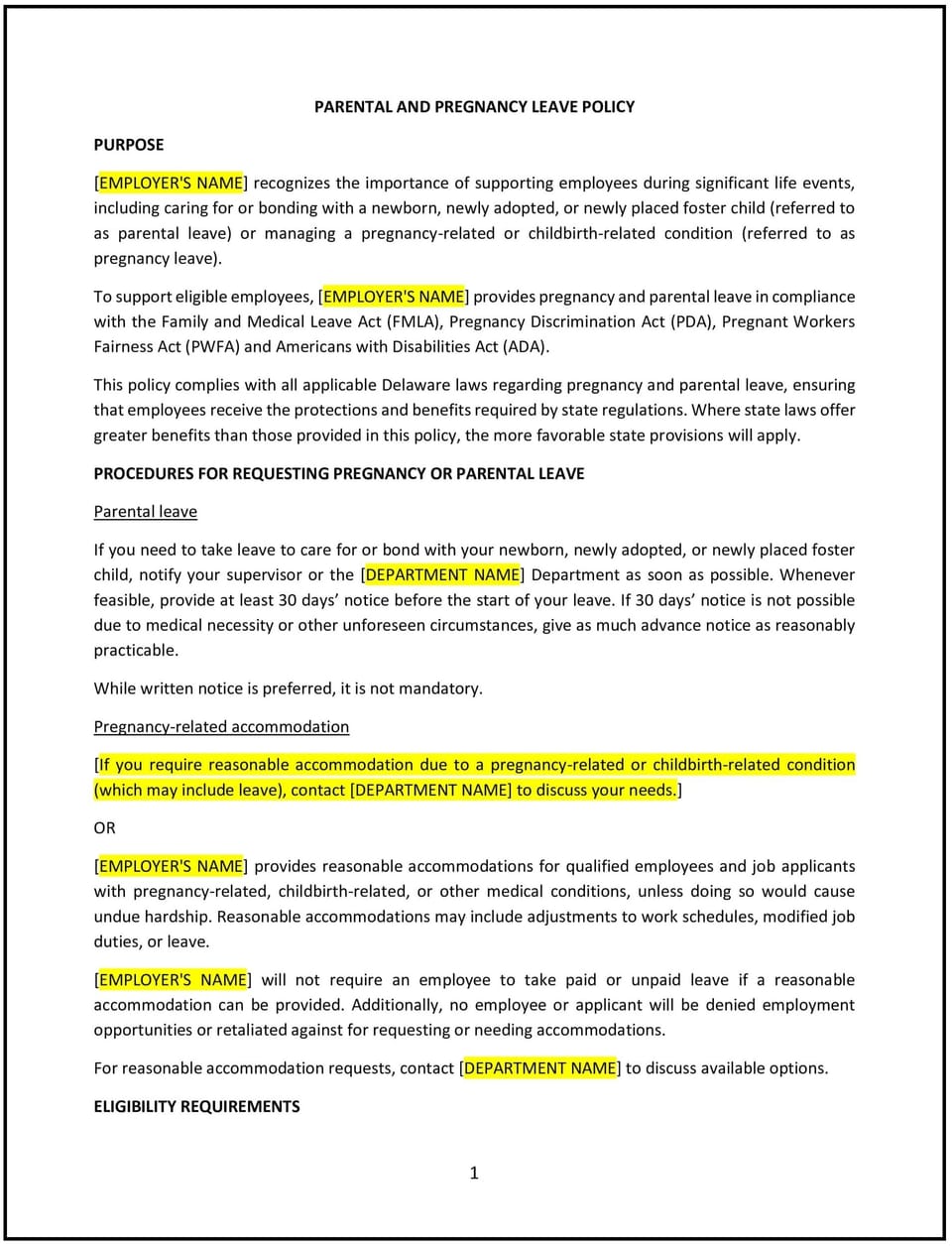Parental and pregnancy leave policy (Delaware): Free template

Parental and pregnancy leave policy (Delaware)
A parental and pregnancy leave policy helps Delaware businesses provide clear guidelines for employees taking leave for childbirth, adoption, or pregnancy-related medical needs. This policy outlines eligibility, leave duration, pay practices, and procedures to ensure compliance with Delaware and federal laws, including the Family and Medical Leave Act (FMLA).
By implementing this policy, businesses can support employees’ family responsibilities, ensure legal compliance, and foster a supportive workplace culture.
How to use this parental and pregnancy leave policy (Delaware)
- Define eligibility: Specify which employees are eligible for parental or pregnancy leave based on employment duration, hours worked, and other criteria outlined in FMLA and Delaware laws.
- Outline leave duration: Clarify the amount of leave available, such as up to 12 weeks of unpaid job-protected leave under FMLA, and any additional company-provided leave.
- Address pay practices: State whether the leave is paid, unpaid, or covered by a combination of PTO, short-term disability, or state-mandated benefits.
- Explain procedures: Provide instructions for requesting leave, including notice requirements and required documentation, such as medical certifications or adoption papers.
- Protect job rights: Assure employees that they will be reinstated to their original or equivalent position upon returning from leave, as required by law.
- Ensure confidentiality: Emphasize the importance of maintaining privacy when handling parental or pregnancy leave requests and related information.
Benefits of using this parental and pregnancy leave policy (Delaware)
This policy offers several benefits for Delaware businesses:
- Supports employee well-being: Allows employees to focus on family responsibilities without fear of job loss.
- Enhances retention: Demonstrates the company’s commitment to work-life balance, encouraging employees to remain with the organization.
- Ensures compliance: Aligns with Delaware and federal laws, reducing the risk of legal disputes or penalties.
- Promotes workplace inclusivity: Supports employees during major life events, fostering a positive and inclusive work culture.
- Improves employee morale: Shows employees that their family responsibilities are valued, enhancing trust and satisfaction.
Tips for using this parental and pregnancy leave policy (Delaware)
- Communicate the policy clearly: Ensure employees are aware of their rights and responsibilities under the policy.
- Provide training: Equip managers and HR staff with knowledge of parental and pregnancy leave laws and procedures.
- Track leave accurately: Maintain detailed records of leave requests and usage to ensure compliance with Delaware and federal requirements.
- Offer additional resources: Provide access to support programs, such as employee assistance programs or parenting resources, to assist employees during their leave.
- Review regularly: Update the policy to reflect changes in FMLA, Delaware laws, or company benefits.
Q: Why is a parental and pregnancy leave policy important for my business?
A: This policy supports employees during major life events, ensures compliance with Delaware and federal laws, and fosters a supportive and inclusive workplace culture.
Q: Who is eligible for parental or pregnancy leave under this policy?
A: Eligibility typically includes employees who have worked for at least 12 months and meet the minimum hours worked requirement, as outlined in FMLA and Delaware-specific regulations.
Q: Is parental and pregnancy leave paid under this policy?
A: The policy may include paid leave through company benefits, PTO, or short-term disability, but Delaware and federal laws generally require unpaid, job-protected leave unless otherwise stated.
Q: What documentation is required to request leave?
A: Employees may need to provide medical certifications, adoption paperwork, or other relevant documents as outlined in the policy.
Q: How often should this policy be reviewed?
A: This policy should be reviewed annually or whenever Delaware laws, FMLA regulations, or company practices regarding parental and pregnancy leave change to ensure continued compliance and relevance.
This article contains general legal information and does not contain legal advice. Cobrief is not a law firm or a substitute for an attorney or law firm. The law is complex and changes often. For legal advice, please ask a lawyer.


